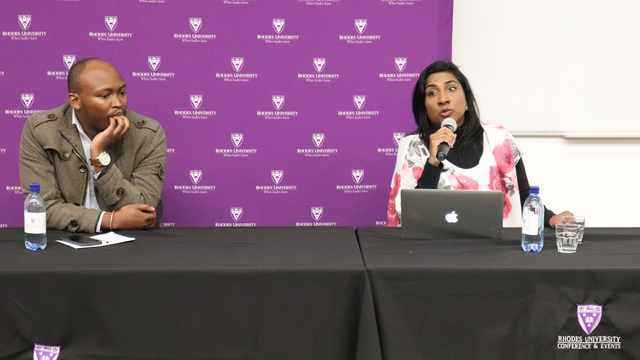
By Boniswa Matiwane, Postgraduate Diploma in Media Management student
The Political and International Studies Department hosted the second day of their annual Teach-In at Barratt Lecture Theatre on 16 July 2019.
The theme this year, The Opposition in Crisis, comes as a result of the increasing numbers of opposition parties in South Africa. This growth pattern has led to key areas of research. Ranjeni Munusamy, Associate Editor of Tiso Blackstar provided a contemporary perspective of this growth pattern by looking extensively at unexpected coalitions and bitter splits.
Munusamy began the conversation by describing the political arena as being in a state of crisis. “The crisis is not a uniquely South African condition but in fact a global matter,” she emphasised.
Some examples she cited include the Conservative Party in the United Kingdom, the Republicans in the United States and the African National Congress (ANC) in South Africa.
South African politics, she said, has found its ideological framework to be somewhat ‘fluid’. This has affected the way in which parties relate and engage with each other. Ideology is a wavering concept in the political environment. This has further made it challenging for there to be coalitions premised on ideology. “Coalitions are indeed not a new concept to the South African political arena,” Munusamy explained.
Due to her role as a reporter at the time of the first coalition, she monitored the situation closely. She used that as a sort of backdrop to a case where coalitions came at the expense of people’s lives, namely that of the coalition in the Natal region between ANC and Inkatha Freedom Party.
“2016 symbolised a clear depiction of the disjunctured nature of coalitions. It was the year where alliances were rife,” she said. Munusamy found that the biggest misconception was the notion of coalition being ‘a partnership’. It became prevalent at the time that the leading party needed to work collaboratively with other parties to establish a strong government. The environment was calling for a network of cooperation and collaboration and political players were evidently aware of this. Thus the Economic Freedom Fighters’ (EFF) step to partner with the Democratic Alliance (DA).
“However, this was unsuccessful as DA’s policies were not in alignment with those of the EFF. So the EFF opted to vote alongside the DA and not get into any coalitions,” she explained.
While the United Democratic Front provided a diverse stance on the forming of alliances, they felt the most ideal venture would be for parties to agree to not contest one another.
“Though a very interesting strategy, parties like the DA failed to stick to the plan. This evidently weakened its alliances and now, year later, we see the previously-turbulent relationship between ANC and EFF to be close and progressive,” Munusamy stated.
She cited Germany as an example of where a coalition has worked effectively. “Their winning formula was not to have similar policies or ideologies. They merely agreed on very definite issues such as climate change, immigration and trade.”
Ultimately, Munusamy observed how the state of crisis in the country cannot simply be attributed to the ANC, as other parties affect it as well. “We need to focus on what binds us, such as nation development, job creation and building a society of equals,” she concluded.

